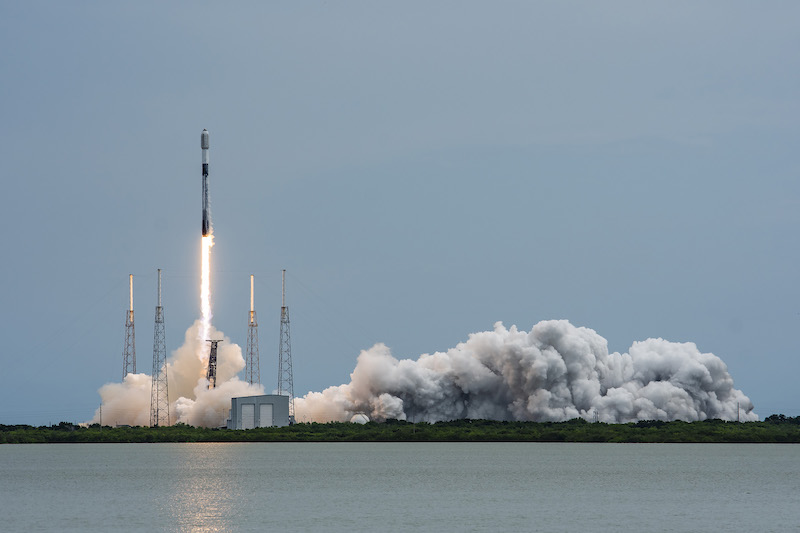
Starlink launches in July 2023
Starlink Group 5-13: July 7, 2023, 12:29 p.m. PDT
Falcon 9 Block 5 | Vandenberg SFB, California | SUCCESS
Starlink Group 6-5: July 9, 2023, 11:58 p.m. EDT
Falcon 9 Block 5 | Cape Canaveral, Florida | SUCCESS
Starlink Group 5-15: July 14, 2023, 12:40 a.m. EDT
Falcon 9 Block 5 | Cape Canaveral, Florida | DATE/TIME MAY CHANGE
Starlink Group 6-15: July 18, 2023, 7:29 p.m. – 1:43 a.m. PDT
Falcon 9 Block 5 | Vandenberg SFB, California | DATE/TIME MAY CHANGE
You can watch a livestream of the launch on SpaceX’s YouTube channel. They typically begin about five minutes before liftoff.
After launch, look for a train of lights
Following every Starlink launch, the internet buzzes with people asking:
What’s that long line of lights in the sky that looks like a train?
What you’re seeing is the Starlink satellites moving into a higher orbit. You can check to see if they will pass over your area using the Find Starlink website.
Growing numbers amid controversy
According to Wikipedia, as of May 2023, Starlink consists of over 4,000 mass-produced small satellites in low Earth orbit that communicate with designated ground transceivers. They provide internet access to more than 1.5 million subscribers.
Love ’em or hate ’em, these Starlink satellites are part of SpaceX’s vision for a global internet communication satellite constellation. They deliver high-speed internet service worldwide, mainly to locations where ground-based internet is unreliable, unavailable, or expensive. The private company is well-known for launching batches back-to-back, several times a month, regularly lofting 60 satellites at a time. And SpaceX plans to build up to perhaps as many as 30,000 eventually.
Most thought it was exciting to see the first few Starlink satellites traveling together in the night sky. But then more were launched, and then more. And astronomers began to worry.
Because Starlinks are bright, astronomers say they’re photobombing astronomical images. Therefore, they have the potential to interfere with the professional astronomical observations that have brought us our modern-day view of the cosmos. And although SpaceX has tried to address the issue, they remain far from what astronomers say is acceptable.
Bottom line: SpaceX’s third Starlink launch for the month is currently scheduled from Florida at 4:40 UTC (12:40 a.m. EDT) on July 14, 2023.
Read more from EarthSky: Starlink satellites can look like a plume or train of light
The post SpaceX Starlink launches for July first appeared on EarthSky.
from EarthSky https://ift.tt/PZanYSA

Starlink launches in July 2023
Starlink Group 5-13: July 7, 2023, 12:29 p.m. PDT
Falcon 9 Block 5 | Vandenberg SFB, California | SUCCESS
Starlink Group 6-5: July 9, 2023, 11:58 p.m. EDT
Falcon 9 Block 5 | Cape Canaveral, Florida | SUCCESS
Starlink Group 5-15: July 14, 2023, 12:40 a.m. EDT
Falcon 9 Block 5 | Cape Canaveral, Florida | DATE/TIME MAY CHANGE
Starlink Group 6-15: July 18, 2023, 7:29 p.m. – 1:43 a.m. PDT
Falcon 9 Block 5 | Vandenberg SFB, California | DATE/TIME MAY CHANGE
You can watch a livestream of the launch on SpaceX’s YouTube channel. They typically begin about five minutes before liftoff.
After launch, look for a train of lights
Following every Starlink launch, the internet buzzes with people asking:
What’s that long line of lights in the sky that looks like a train?
What you’re seeing is the Starlink satellites moving into a higher orbit. You can check to see if they will pass over your area using the Find Starlink website.
Growing numbers amid controversy
According to Wikipedia, as of May 2023, Starlink consists of over 4,000 mass-produced small satellites in low Earth orbit that communicate with designated ground transceivers. They provide internet access to more than 1.5 million subscribers.
Love ’em or hate ’em, these Starlink satellites are part of SpaceX’s vision for a global internet communication satellite constellation. They deliver high-speed internet service worldwide, mainly to locations where ground-based internet is unreliable, unavailable, or expensive. The private company is well-known for launching batches back-to-back, several times a month, regularly lofting 60 satellites at a time. And SpaceX plans to build up to perhaps as many as 30,000 eventually.
Most thought it was exciting to see the first few Starlink satellites traveling together in the night sky. But then more were launched, and then more. And astronomers began to worry.
Because Starlinks are bright, astronomers say they’re photobombing astronomical images. Therefore, they have the potential to interfere with the professional astronomical observations that have brought us our modern-day view of the cosmos. And although SpaceX has tried to address the issue, they remain far from what astronomers say is acceptable.
Bottom line: SpaceX’s third Starlink launch for the month is currently scheduled from Florida at 4:40 UTC (12:40 a.m. EDT) on July 14, 2023.
Read more from EarthSky: Starlink satellites can look like a plume or train of light
The post SpaceX Starlink launches for July first appeared on EarthSky.
from EarthSky https://ift.tt/PZanYSA

Aucun commentaire:
Enregistrer un commentaire